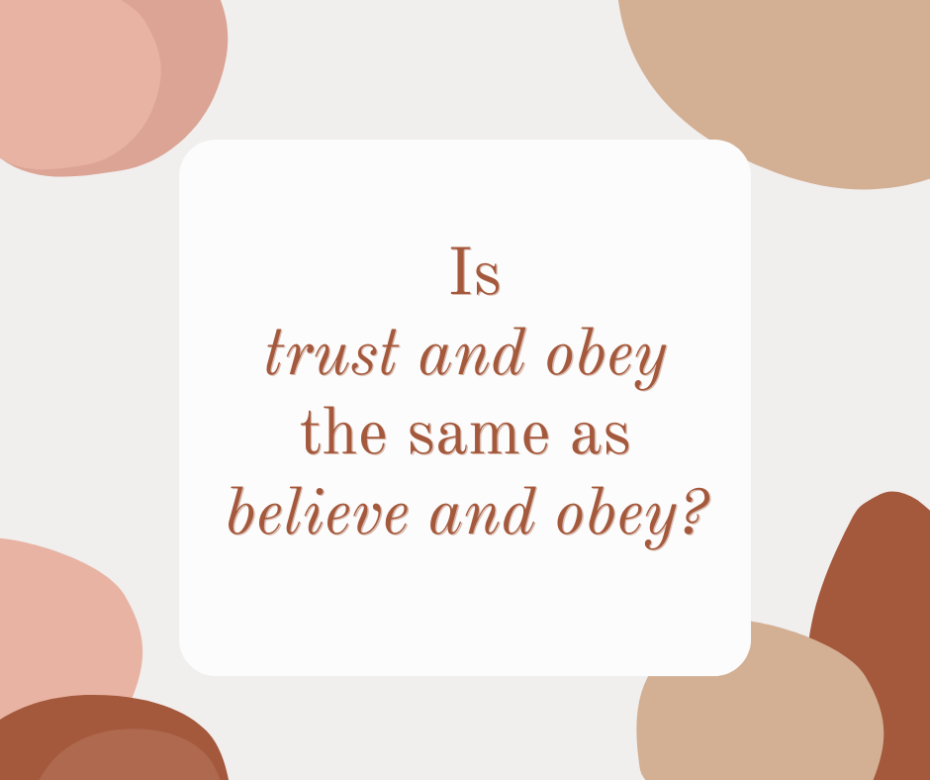Yesterday at church, we sang the song “Trust and Obey.” That led to this blog.
Is trust and obey the same as believe and obey?
When we believe God, we are persuaded or convinced that what He said is true.
Joshua and Caleb believed God when He promised to give Israel the land of Canaan if the people would go up. He guaranteed the victory. The other ten spies did not believe God.
Nicodemus believed Jesus’ promise of everlasting life to whoever simply believes in Him for it (John 3:16). So did the woman at the well (John 4:10-30).
Mary believed that though she was a virgin, she would bear a son (Luke 1:31-38).
None of these people trusted God for those things. They believed Him. There is a difference.
We trust God for things He has not explicitly promised.
We believe God for things He has promised.
We may trust God for things such as the following:
- My job will continue.
- My health will continue.
- My spouse will remain faithful.
- The United States will not collapse during my lifetime.
- Anarchy will not take over my city.
- I will be safe driving, flying, skiing, and riding on Uber.
The NT uses several Greek words sometimes translated as trust: elpizō, elpis, and peithō. Here are some NT examples:
Paul said, “We are well known to God, and I also trust [or hope] are well known in your consciences” (2 Cor 5:11).
“Also He spoke this parable to some who trusted [or hoped] in themselves that they were righteous, and despised others” (Luke 18:9).
“But I trust [hope] that you will know that we are not disqualified” (2 Cor 13:6).
“Now she who is really a widow, and left alone, trusts in [relies on] God and continues in supplications and prayers night and day” (1 Tim 5:5).
The closest we get to trust referring to belief is Eph 1:12:
“that we who first trusted [or hoped] in Christ should be to the praise of His glory.”
That might refer to believing in Him for everlasting life. More likely, however, it refers to believing the soon return of Christ, which is the hope of believers walking in fellowship with Him (Rom 5:2; Eph 1:18; Col 1:27; 1 Thess 2:19).
Jamieson, Fausset, and Brown comment, “who first trusted in Christ—rather (we Jewish Christians), ‘who have before hoped in the Christ’: who before the Christ came, looked forward to His coming, waiting for the consolation of Israel” (pp. 342-43). They understand it to refer to belief in Christ’s first coming before He came on the scene. However, Paul includes himself. While he was looking for the Messiah’s coming, he rejected Jesus as the Christ until the road to Damascus. Paul is referring to Jesus here. Better to see this as referring to Jewish Christians who first were looking for His Second Coming, waiting for the consolation of Israel.
Lenski takes the view I’m suggesting:
Very few of those who had been converted to Christianity had ever had a true, spiritual hope in the Christ; almost all of them had had a carnal hope in a political Messiah. Had this been to the praise of God’s glory? The true hope had entered the hearts of these Jewish Christians in Ephesus when they were converted (Galatians, Ephesians, and Philippians, p. 380).
While we believe–that is, while we are convinced–that Jesus is coming again soon, we trust or hope that He returns in our lifetimes. We are sure of the former but not the latter.
When I fly, I trust the airline, the airplane, and the pilots. Most of all, I trust God while flying. I do not believe I am guaranteed to arrive safely, but I trust I will.
I trust my doctor when surgery is needed. However, I do not believe that a good outcome is guaranteed.
I suggest that we avoid using trust when we’re talking about believing in Jesus. The Biblical word is believe, not trust.
Trust and obey? Absolutely. But don’t forget to believe and obey as well!


